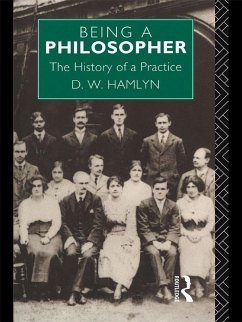Philosophers often find that the response 'I am a philosopher' when given in reply to the question 'What do you do?' produces a puzzled silence. The puzzle is not one simply about the nature of philosophical thought, it is one about what philosophers actually do. David Hamlyn's enjoyable and illuminating account is the first to consider the history of the practice of philosophy, or of philosophy considered as an institution. Being a Philosopher examines the main trends of that practice and how philosophers have been regarded at different times. The Greek philosophical schools provided the first professional philosophers. While philosophy played a significant role in the setting up of the universities in the Middle Ages, it was severely limited by its subservience to theology. He considers the great philosophers of the seventeenth and eighteenth centuries, exploring the issues of why so few had anything to do with teaching or any other institutional arrangements. The later part of the book outlines the progressive professionalism of philosophy, the emergence of philosophical journals and societies, and current arrangements for the practice of philosophy in higher education. In his conclusion, David Hamlyn draws certain morals from the history provided, emphasizing the importance of philosophical teaching and the institutional backing for it, while noting the implicit paradox that many of the major philosophers had no interest in teaching.
Dieser Download kann aus rechtlichen Gründen nur mit Rechnungsadresse in A, B, BG, CY, CZ, D, DK, EW, E, FIN, F, GR, HR, H, IRL, I, LT, L, LR, M, NL, PL, P, R, S, SLO, SK ausgeliefert werden.









